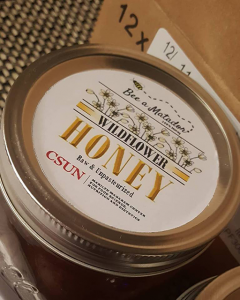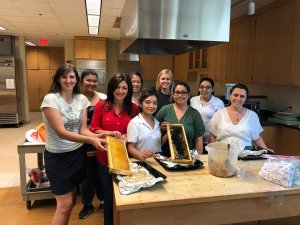Dietetics Grad Students Learn to Market Homegrown Honey Through I-Corps, CSUN Nazarian College

CSUN’s Marilyn Magaram Center sells honey harvested from campus bees. Submitted photo.
“Bee a Matador,” CSUN’s homegrown honey, has been a huge success in the Campus Store and in holiday gift baskets, and the students and faculty members who produce it want its impact to be even greater.
Students in CSUN’s Marilyn Magaram Center for Food Science, Nutrition, and Dietetics in the College of Health and Human Development in collaboration with biology associate professor and beekeeper Rachel Mackelprang have optimized their honey production, but needed help reaching a wider audience. To learn more about customers’ needs and better market their delicious product, they turned to CSUN’s Innovation Corps (I-Corps) program and their fellow students.
CSUN’s David Nazarian College of Business and Economics and I-Corps Program collaborated to assist the Magaram Center students with their research, testing and marketing of the hometown honey.
“This project was tough! We learned a lot by having our methods grilled by I-CORPS mentors,” Sophia Villicana and Karim Danji, two students who worked on the project, said in a statement. “What we learned is that there is more to starting a business than just your idea behind it. It allows you to view the points of potential customers and what they are look for in a product.”
The Magaram Center has worked with the I-Corps program for several years on business plans for many products, including Matador Sol Sauce, the Spicy Matador seasoning, the FitJams, Matador Protein bars, and the ProJel, which this year was a Bull Ring semifinalist. Magaram Center students have used the resources and skills learned as they’ve gone on to their own businesses or careers, said Annette Besnilian, executive director of the Magaram Center.
With the I-Corps research and testing completed by the graduate dietetic students) created specific messaging along with packaging and labeling options that appealed to a CSUN demographic. Marketing professor Qin Sun’s students provided recommendations for additional marketing.
“In their future, students can use all the skills and knowledge learned, such as developing products, processing food, bottling, labeling, cost analysis, marketing and conducting customer discovery,” Besnilian said.
With I-Corps, the dietetic graduate students worked to research and develop target audience needs and solutions, said Tim Tiemann, Managing Director of the CSUN Innovation Incubator in the Nazarian College.

Photo courtesy of the Magaram Center.
What they learned was that if they sold honey through typical channels, it would be a fairly low-margin, high-volume business that didn’t suit the supply from unique campus hives, Tiemann said. However, if packaged and labeled in a way that appealed to those with a strong CSUN connection, the origins and nature of the honey made this truly appealing to attractive market segments, and would increase traffic to campus-based sales outlets, Tiemann said.
“I-Corps training enabled the team to find evidence of a market and types of customers for whom this product had real appeal; the beauty of I-Corps is that these customer discovery techniques can be taught to anyone, irrespective of their educational background,” Tiemann said. “Within this framework, Nazarian College marketing students were able to craft very focused messaging and packaging that fulfilled these customer expectations.”
“The nutrition, dietetics and food science students have learned so much about the process and developing a business plan,” Besnilian said. “In addition, we have learned from Rachel Mackelprang [biology professor and campus beekeeper] to reach beyond food — and develop wellness products by using the beeswax for things such as lip balm and lotion.”
Beyond the commercial value, this project had a real impact on the environment and the CSUN community, according to the faculty and staff involved.
Students in the biology department have the opportunity to conduct research on the campus bee colonies, investigating the relationships between bees and their microbial symbionts that are critical to bee health. The colonies are also part larger effort by CSUN’s Institute for Sustainability to create habitats for pollinators. In 2018, CSUN became the 57th campus in the United States to become a Bee Campus USA affiliate.
“The CSUN community is a creative, interactive space where students’ interests and aspirations can be cultivated and refined,” Tiemann said. “This project may not create a fortune, but the team learned how to draw from the collective wisdom of others to create something new and valuable. This takes perseverance, commitment and a host of soft skills. Learning how to effectively translate your passion into something tangible and useful to others improves our society.”
“This venture is an example of what the Nazarian College does best,” said Chandra Subramaniam, dean of the CSUN David Nazarian College of Business and Economics. “Building an entrepreneurial ecosystem for the university by bringing students from multiple colleges, and programs to ideate, create and develop ideas through the I-Corps, Summer Accelerator, Bull Ring, and other competitions, so students learn how to build products that are marketable, which ultimately become businesses they can be proud of.”

 experience
experience